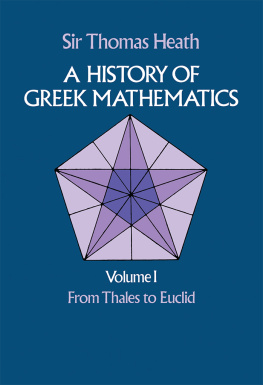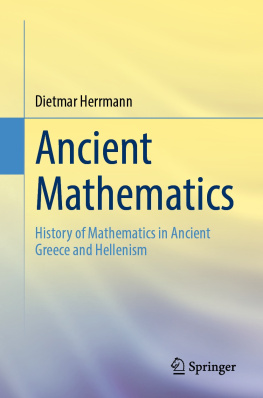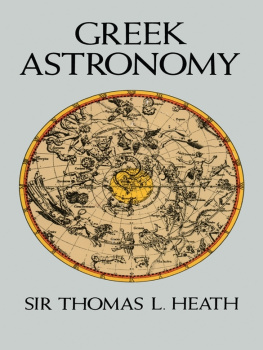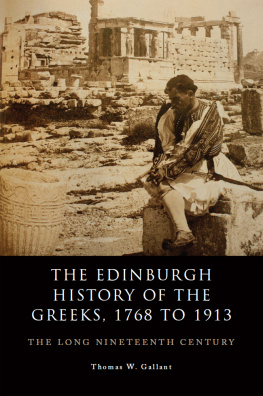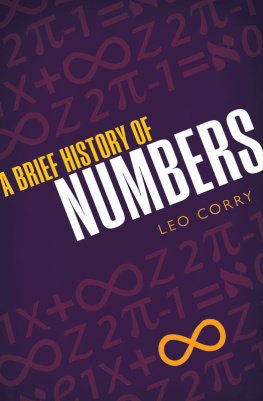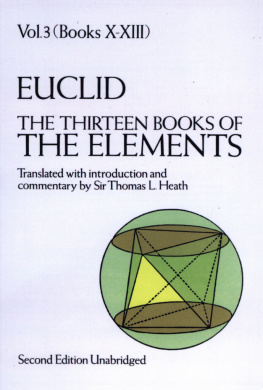Sir Thomas Heath - A History of Greek Mathematics Volume 1
Here you can read online Sir Thomas Heath - A History of Greek Mathematics Volume 1 full text of the book (entire story) in english for free. Download pdf and epub, get meaning, cover and reviews about this ebook. year: 2013, publisher: Dover Publications, Inc., genre: Religion. Description of the work, (preface) as well as reviews are available. Best literature library LitArk.com created for fans of good reading and offers a wide selection of genres:
Romance novel
Science fiction
Adventure
Detective
Science
History
Home and family
Prose
Art
Politics
Computer
Non-fiction
Religion
Business
Children
Humor
Choose a favorite category and find really read worthwhile books. Enjoy immersion in the world of imagination, feel the emotions of the characters or learn something new for yourself, make an fascinating discovery.
- Book:A History of Greek Mathematics Volume 1
- Author:
- Publisher:Dover Publications, Inc.
- Genre:
- Year:2013
- Rating:3 / 5
- Favourites:Add to favourites
- Your mark:
- 60
- 1
- 2
- 3
- 4
- 5
A History of Greek Mathematics Volume 1: summary, description and annotation
We offer to read an annotation, description, summary or preface (depends on what the author of the book "A History of Greek Mathematics Volume 1" wrote himself). If you haven't found the necessary information about the book — write in the comments, we will try to find it.
A History of Greek Mathematics Volume 1 — read online for free the complete book (whole text) full work
Below is the text of the book, divided by pages. System saving the place of the last page read, allows you to conveniently read the book "A History of Greek Mathematics Volume 1" online for free, without having to search again every time where you left off. Put a bookmark, and you can go to the page where you finished reading at any time.
Font size:
Interval:
Bookmark:
A HISTORY OF
GREEK MATHEMATICS
SIR THOMAS HEATH
VOLUME I
FROM THALES TO EUCLID
An independent world,
Created out of pure intelligence.
Wordsworth
Dover Publications, Inc.
New York
This Dover edition, first published in 1981, is an unabridged republication of the work first published in 1921 by the Clarendon Press, Oxford. For this edition the errata of the first edition have been corrected.
eInternational Standard Book Number 13: 978-0-4861-62690
Library of Congress Catalog Card Number: 80-70126
Manufactured in the United States of America
Dover Publications, Inc.
31 East 2nd Street, Mineola, N.Y. 11501
PREFACE
T HE idea may seem quixotic, but it is nevertheless the authors confident hope that this book will give a fresh interest to the story of Greek mathematics in the eyes both of mathematicians and of classical scholars.
For the mathematician the important consideration is that the foundations of mathematics and a great portion of its content are Greek. The Greeks laid down the first principles, invented the methods ab initio, and fixed the terminology. Mathematics in short is a Greek science, whatever new developments modern analysis has brought or may bring.
The interest of the subject for the classical scholar is no doubt of a different kind. Greek mathematics reveals an important aspect of the Greek genius of which the student of Greek culture is apt to lose sight. Most people, when they think of the Greek genius, naturally call to mind its masterpieces in literature and art with their notes of beauty, truth, freedom and humanism. But the Greek, with his insatiable desire to know the true meaning of everything in the universe and to be able to give a rational explanation of it, was just as irresistibly driven to natural science, mathematics, and exact reasoning in general or logic. This austere side of the Greek genius found perhaps its most complete expression in Aristotle. Aristotle would, however, by no means admit that mathematics was divorced from aesthetic; he could conceive, he said, of nothing more beautiful than the objects of mathematics. Plato delighted in geometry and in the wonders of numbers; , said the inscription over the door of the Academy. Euclid was a no less typical Greek. Indeed, seeing that so much of Greek is mathematics, it is arguable that, if one would understand the Greek genius fully, it would be a good plan to begin with their geometry.
The story of Greek mathematics has been written before. Dr. James Gow did a great service by the publication in 1884 of his Short History of Greek Mathematics, a scholarly and useful work which has held its own and has been quoted with respect and appreciation by authorities on the history of mathematics in all parts of the world. At the date when he wrote, however, Dr. Gow had necessarily to rely upon the works of the pioneers Bretschneider, Hankel, Allman, and Moritz Cantor (first edition). Since then the subject has been very greatly advanced; new texts have been published, important new documents have been discovered, and researches by scholars and mathematicians in different countries have thrown light on many obscure points. It is, therefore, high time for the complete story to be rewritten.
It is true that in recent years a number of attractive histories of mathematics have been published in England and America, but these have only dealt with Greek mathematics as part of the larger subject, and in consequence the writers have been precluded, by considerations of space alone, from presenting the work of the Greeks in sufficient detail.
The same remark applies to the German histories of mathematics, even to the great work of Moritz Cantor, who treats of the history of Greek mathematics in about 400 pages of vol. i. While no one would wish to disparage so great a monument of indefatigable research, it was inevitable that a book on such a scale would in time prove to be inadequate, and to need correction in details; and the later editions have unfortunately failed to take sufficient account of the new materials which have become available since the first edition saw the light.
The best history of Greek mathematics which exists at present is undoubtedly that of Gino Loria under the title Le scienze esatte nell antica Grecia (second edition 1914, Ulrico Hoepli, Milano). Professor Loria arranges his material in five Books, (1) on pre-Euclidean geometry, (2) on the Golden Age of Greek geometry (Euclid to Apollonius), (3) on applied mathematics, including astronomy, sphaeric, optics, &c., (4) on the Silver Age of Greek geometry, (5) on the arithmetic of the Greeks. Within the separate Books the arrangement is chronological, under the names of persons or schools. I mention these details because they raise the question whether, in a history of this kind, it is best to follow chronological order or to arrange the material according to subjects, and, if the latter, in what sense of the word subject and within what limits. As Professor Loria says, his arrangement is a compromise between arrangement according to subjects and a strict adherence to chronological order, each of which plans has advantages and disadvantages of its own.
In this book I have adopted a new arrangement, mainly according to subjects, the nature of which and the reasons for which will be made clear by an illustration. Take the case of a famous problem which plays a great part in the history of Greek geometry, the doubling of the cube, or its equivalent, the finding of two mean proportionals in continued proportion between two given straight lines. Under a chronological arrangement this problem comes up afresh on the occasion of each new solution. Now it is obvious that, if all the recorded solutions are collected together, it is much easier to see the relations, amounting in some cases to substantial identity, between them, and to get a comprehensive view of the history of the problem. I have therefore dealt with this problem in a separate section of the chapter devoted to Special Problems, and I have followed the same course with the other famous problems of squaring the circle and trisecting any angle.
Similar considerations arise with regard to certain well-defined subjects such as conic sections. It would be inconvenient to interrupt the account of Menaechmuss solution of the problem of the two mean proportionals in order to consider the way in which he may have discovered the conic sections and their fundamental properties. It seems to me much better to give the complete story of the origin and development of the geometry of the conic sections in one place, and this has been done in the chapter on conic sections associated with the name of Apollonius of Perga. Similarly a chapter has been devoted to algebra (in connexion with Diophantus) and another to trigonometry (under Hipparchus, Menelaus and Ptolemy).
At the same time the outstanding personalities of Euclid and Archimedes demand chapters to themselves. Euclid, the author of the incomparable Elements, wrote on almost all the other branches of mathematics known in his day. Archimedess work, all original and set forth in treatises which are models of scientific exposition, perfect in form and style, was even wider in its range of subjects. The imperishable and unique monuments of the genius of these two men must be detached from their surroundings and seen as a whole if we would appreciate to the full the pre-eminent place which they occupy, and will hold for all time, in the history of science.
The arrangement which I have adopted necessitates (as does any other order of exposition) a certain amount of repetition and cross-references; but only in this way can the necessary unity be given to the whole narrative.
One other point should be mentioned. It is a defect in the existing histories that, while they state generally the contents of, and the main propositions proved in, the great treatises of Archimedes and Apollonius, they make little attempt to describe the procedure by which the results are obtained. I have therefore taken pains, in the most significant cases, to show the course of the argument in sufficient detail to enable a competent mathematician to grasp the method used and to apply it, if he will, to other similar investigations.
Next pageFont size:
Interval:
Bookmark:
Similar books «A History of Greek Mathematics Volume 1»
Look at similar books to A History of Greek Mathematics Volume 1. We have selected literature similar in name and meaning in the hope of providing readers with more options to find new, interesting, not yet read works.
Discussion, reviews of the book A History of Greek Mathematics Volume 1 and just readers' own opinions. Leave your comments, write what you think about the work, its meaning or the main characters. Specify what exactly you liked and what you didn't like, and why you think so.

